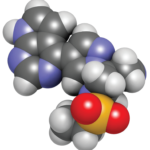The authors concluded that, in this real-world study, patients receiving JAK inhibitor therapy did not have a significantly higher risk of MACE than patients treated with a TNFα inhibitor, although they note other registries need to be included in the future to increase statistical power.
Glucocorticoid Bridging
Lotte van Ouwerkerk, PhD candidate, Leiden University Medical Center, Netherlands, discussed how initial glucocorticoid bridging in RA may affect glucocorticoid use over time.3
Data were analyzed from the BeST, CareRA and COBRA trials, which had study arms with and without use of glucocorticoid bridging in patients, in addition to csDMARD therapy. Glucocorticoid-bridging schedules were planned for a minimum of 34–36 weeks across these studies. In this individual patient data meta-analysis, the researchers compared glucocorticoid use between bridgers and non-bridgers at 12, 18 and 24 months from baseline and used this as the primary outcome.
The results indicated that compared with non-bridgers, after the glucocorticoid bridging therapy period, which lasted an average of 35 weeks, bridgers had an increased risk of using glucocorticoids at the 12-month mark from baseline, but not at the 18- or 24-month intervals. The cumulative glucocorticoid dose, including the planned bridging period, was significantly higher for bridgers than non-bridgers, translating into a difference of 4 mg a day for two years. Bridgers did have a more rapid decrease in their Disease Activity Score-28 (DAS28) in the first six months of therapy than non-bridgers, but there were no differences in DAS28 or number of flares after the end of the bridging schedules. Thus, the benefits and risks of glucocorticoid bridging should be weighed carefully and considered for each individual patient.
Zoster
The final presentation was given by Kevin Winthrop, MD, MPH, professor of infectious diseases and ophthalmology, School of Medicine, Oregon Health & Science University (OHSU), Portland, and a professor of public health at the OHSU-PSU School of Public Health. The study that Dr. Winthrop discussed sought to assess the immunogenicity of adjuvanted recombinant zoster vaccine (RZV; Shingrix) in patients with RA on background methotrexate treated with 15 mg of upadacitinib once daily.4,5
Researchers evaluated patients aged 50 and older from the phase 3 SELECT-COMPARE trial. The patients were on stable doses of upadacitinib and background methotrexate for eight weeks or longer before their first vaccination dose and four weeks or longer after the second vaccination dose. The primary end point for the study was the proportion of patients with a humoral response to RZV as defined by fourfold or greater increase in pre-vaccination concentration of anti-glycoprotein E titer levels at week 16.


